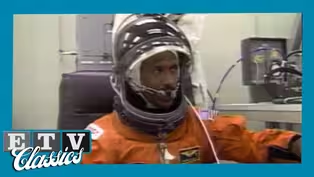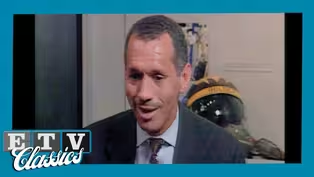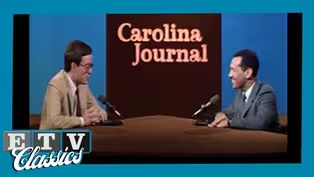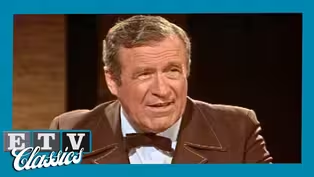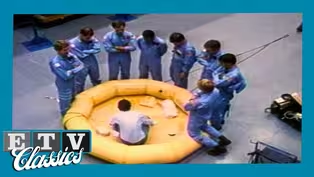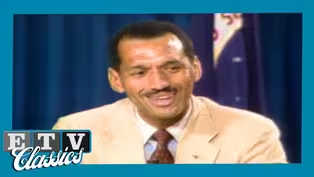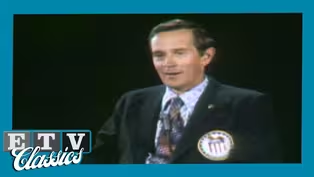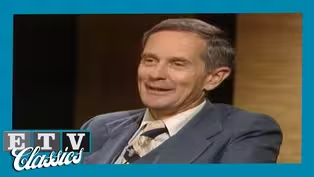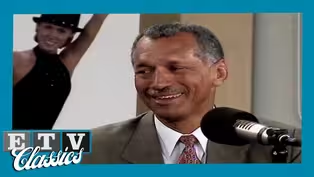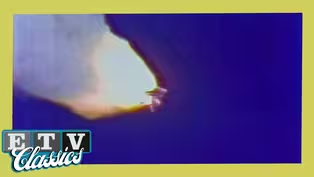ETV Classics
Journalist in Space | Carolina Journal (1986)
Season 14 Episode 2 | 27m 52sVideo has Closed Captions
Host Tom Fowler interviews Jack Bass, a member of NASA’s Journalist-In Space project.
Marking the agency’s second major project to involve non-astronauts in spaceflight, NASA aimed to send a civilian journalist into orbit. Follow along in this episode of Carolina Journal as Tom Fowler hosts Jack Bass, a member of NASA’s Journalist-In Space project.
Problems playing video? | Closed Captioning Feedback
Problems playing video? | Closed Captioning Feedback
ETV Classics is a local public television program presented by SCETV
Support for this program is provided by The ETV Endowment of South Carolina.
ETV Classics
Journalist in Space | Carolina Journal (1986)
Season 14 Episode 2 | 27m 52sVideo has Closed Captions
Marking the agency’s second major project to involve non-astronauts in spaceflight, NASA aimed to send a civilian journalist into orbit. Follow along in this episode of Carolina Journal as Tom Fowler hosts Jack Bass, a member of NASA’s Journalist-In Space project.
Problems playing video? | Closed Captioning Feedback
How to Watch ETV Classics
ETV Classics is available to stream on pbs.org and the free PBS App, available on iPhone, Apple TV, Android TV, Android smartphones, Amazon Fire TV, Amazon Fire Tablet, Roku, Samsung Smart TV, and Vizio.
Providing Support for PBS.org
Learn Moreabout PBS online sponsorshipMore from This Collection
South Carolina is home to astronauts Charles Duke, Ronald McNair, and Charles Bolden Jr.
South Carolina in the Space Age | Palmetto Specials (1991)
Video has Closed Captions
A look back at the experiences of Charles F. Bolden Jr. and his rise to becoming an astronaut. (18m 50s)
Conversations with Scientists and Astronauts: Charles Bolden, Part 1 (1998)
Video has Closed Captions
Learn alongside students as they ask astronaut Charles F. Bolden Jr. questions. (19m 1s)
Colonel Charles Bolden: Aftermath of the Challenger | Carolina Journal (1986)
Video has Closed Captions
Colonel Charles Bolden offers a candid reflection on the space shuttle 'Challenger' disaster. (27m 50s)
Space Shuttle: Delays & Possibilities for the Future with Dr. LeConte Cathey | Open Line (1981)
Video has Closed Captions
Dr. LeConte Cathey discusses satellites, the space shuttle, and maintaining technology for space. (28m 47s)
South Carolina Astronauts | Venture (1986)
Video has Closed Captions
Learn more about the firsthand experiences of astronauts Charles Duke and Charles Bolden Jr. (6m 51s)
Profile: Charles F. Bolden Jr. | Carolina Journal (1986)
Video has Closed Captions
A special look at the extraordinary legacy and life journey of astronaut Charles Bolden. (58m 59s)
Kennedy Space Center: Apollo 16 Launch | Nine30 (1972)
Video has Closed Captions
An in-depth look at the launch of Apollo 16 as well as the legacy of the Kennedy Space Center. (30m 6s)
General Charles Duke | Open Line (1983)
Video has Closed Captions
Host Tom Fowler interviews Apollo 16 astronaut Charles Duke about his career with NASA. (28m 50s)
Brigadier General Charles Bolden Jr. | Xpress (2003)
Video has Closed Captions
An interview with former NASA administrator and astronaut Charles Bolden. (26m 45s)
Shuttle Challenger Accident | Carolina Journal (1986)
Video has Closed Captions
Host Tom Fowler brings the breaking news about the Space Shuttle Challenger to South Carolina. (29m 38s)
Providing Support for PBS.org
Learn Moreabout PBS online sponsorshipAnnouncer> A production of the South Carolina Educational Television Network.
♪ Tom> Tonight on Carolina Journal, the deadline on "Journalist In Space."
The applications are due today, We'll check on how they're coming.
And we'll have a report on Mac Holladay, the new Executive Director of the Development Board.
Good evening everyone, I'm Tom Fowler.
Today is January 15th and that's the deadline for the "Journalist In Space Project."
There's going to be a teacher in space on the upcoming shuttle mission this January.
And if all things go well this fall, there will be a journalist in space, the first one selected by a process that begins, right now.
Jack Bass is with us as our guest.
Jack is no stranger to South Carolina.
Veteran author.
Reporter.
Run, ran for Congress one time.
You've done about everything.
The chief editor of a series on the American South that's aired on public television, produced through here.
And, Jack, you're now with the "Journalist In Space Project."
What is that... project, right now?
How many people are working on the project?
> We have probably, six or eight people working on the project.
Five of us really working full time and others part time.
The Association of Schools of Journalism and Mass Communication, which is the professional organization of, in journalism education in this country, is located at the University of South Carolina.
They're headquartered there.
And as ASJMC has been selected by NASA, is asked by NASA to coordinate the selection process for the "Journalist In Space Project."
And that is the second project in the "Participant in Space Program" of NASA.
The teacher, that you mentioned is the first of the, of those projects.
Tom> Now you, at the beginning of this, when the applications were first... announced, there were anticipated perhaps as many as 4 or 5000 requests for applications.
How have the numbers, progressed and how have they matched your estimates?
> Well, we have sent out more than 5000 application forms.
We've had requests from more than 4000 individuals.
We've had, some have been multiple request from some large news organizations, some, I think one of the networks, wanted 50 forms, for example.
So in that sense, they definitely have met expectations, have been pretty much right on the mark.
As of last Friday, we only had 49 that had come back completed, and some people were getting antsy.
And I said, well, journalists tend to operate on deadlines and I anticipate they'll start flooding in next week, which is this week.
So we had, let's see we had 49, last Friday.
As of right now, we have more than 400.
Which is an 800 percent increase.
I say that in jest, because I always like to say how you can exaggerate sometimes with statistics.
So well we do have more than 400 now, and I anticipate we are going to have a big flood tomorrow.
The deadline is, that applications must be postmarked by midnight tonight.
Tom> And that's the final deadline.
Jack> That is the final deadline.
Tom> And the applications are fairly strict.
If they aren't exactly according to the applications.
Applications are rejected.
Jack> That is correct.
They'll be treated on a case by case basis.
We're not trying to eliminate anybody on some technical detail.
And so if someone, for example, might fail to make a duplicate copy of the application, which is required, we'll probably go ahead and Xerox it for them once we get caught up with everything else.
So minor details that can be taken care of I expect will be somewhat flexible.
But if someone doesn't meet the deadline on getting it in, they will not be eligible.
Tom> Well, let's take a look at, interview, Sheila Chaney talked with a number of journalists.
They were covering the flight of Charlie Bolden, who's... Well, I guess he will come down tomorrow, about a day early.
But, prior to that, they had ample opportunity with all the stops and starts of that mission to talk to a number of journalists.
Some had applied, some had not.
And let's take a look at that.
We can see the, the video of the shuttle area.
And of course when, someone's covering that shuttle launch, they arrive at the site early in the morning about 1:30 a.m. for a dawn flight.
And this is the early morning hours at Kennedy Space Center Cape Canaveral.
In the press room where people have been covering space launches, shuttle launches for a number of years.
Joe> Joe Marino with Aero-Space Reports Television.
Sheila> Have you applied for the "Journalist In Space Program?"
Joe> Actually, I haven't, simply because NASA requires a five year tenure in order to apply and being that, I've only been doing it for a year now.
I guess I'm about four and a half years short.
Mike Livingston, with The State Newspaper back in Palmetto Land.
Sheila> Have you applied for the "Journalist In Space Program," Mike?
Mike> You betcha.
I can't wait.
Sheila> What do you expect to gain from your selection, should you be chosen?
Mike> Well, it'd be nice to leave the planet now and then, don't you think, you know, see what's happening out there among the stars, you know.
Tell the folks about it.
Tracy> I'm Tracy Moore, and I'm here with the Daytona Times Newspaper.
Sheila> Have you applied for the "Journalist In Space Program?"
Tracy> No, I haven't.
Sheila> Can you tell me why?
Tracy> Well, I think it's an interesting concept to put, civilians into space, but I'm one of the few, probably, maybe not a few, but a lot of civilians who would rather wait till they have it a little bit more comfortable for the civilians instead of, the zero gravity.
Maybe, once they do a little bit more experimentation on, sickness in space and things like that, I might be interested in going.
But right now it looks like a shaky trip.
Sheila> Have you applied for the "Journalist in Space Program?"
Reporter> No, I haven't.
No.
Sheila> Why have you not?
Reporter> I hadn't really thought about it.
Cherry Key, WTVX Fort Pierce, Florida.
Sheila> Have you applied for the "Journalism In Space Program?"
Cherry> No, I have not.
Sheila> And may I ask why not?
Cherry> I'm just not very adventuresome when it comes to something like that.
I believe it should be done, but it's just not anything that I want to do.
Sheila> There are quite a few people applying, thousands from across the United States, and it's quite an opportunity.
And you're willing to pass it up?
Cherry> For now, yes.
Sheila> You're saying that you do believe the journalist should go into space, why?
Cherry> Because a journalist is trained to explain phenomenon to the public, and no one has done that yet in terms of the space program.
Chet> I'm Chet Leonard, I'm the aerospace writer for Florida Today here in Cocoa, Florida, right outside the Space Center.
And I also write for USA today and Gannett News Service.
I've applied for the "Journalist In Space Program," and...
I have my fingers crossed.
And obviously I think it's a good idea.
I think the Space Program...
I'm sort of a neophyte, I've been doing this for a year now, and before I came down here, I knew... roughly what most people do about the Space Program, which is unfortunately not very much.
And once I saw my first shuttle liftoff, I was sort of an instant convert.
And, in the interim months, I've really become a big fan.
And I think that it's something that... America does that people really don't understand the value of or the significance of.
Sue> Hey, My name is Sue Davis.
I'm with KTRH Radio in Houston, Texas.
And I've been covering the Space Program for about two years now.
Sheila> Have you applied for the "Journalist In Space Program?"
Sue> Yes, I have.
Sheila> Why have you applied?
Sue> I think a reporter, the closer they can get to a story, the more they can understand it firsthand, the better a job they can do at reporting it.
So that's why I've applied to try to fly on the shuttle.
Sheila> What do you expect to gain personally from this experience?
Sue> Oh, I think it would be the most wonderful experience in the world.
There's so few people that get to do that.
And I think it would just be just fantastic.
To me, the Space Program is the most important, one of the most important things the government has going right now.
And I would just love to be a part of it.
Sheila> What do you expect to contribute should you be chosen?
Sue> I think... the Space Program has lost a lot of its glamour.
It's become so routine now that reporters don't cover it as heavily as they used to.
People don't seem to care about it as much as they used to.
Bob> My name is Bob Secter.
I'm with the Los Angeles Times , and this is only the second space shot I've covered.
Actually, only the first launch.
Sheila> So you're a novice, so to speak.
Is that, is that correct?
Have you applied for the "Journalist In Space Program?"
Bob> No, I haven't.
Sheila> Why have you not?
Bob> I simply got so busy in December that I totally forgot to.
I normally cover Congress, and that was, pretty hectic time for, for Congress, so I just never got around it.
Sheila> You still have some time, January 15th is the deadline.
Bob> That's right.
And... maybe I'll get an application before I leave here.
Tom> Those interviews taped last week in Florida.
Any of those surprise you?
Jack> No, I think that's, fairly good.
I was interested in seeing them.
Tom> Talk a bit about the process beginning today until the launch.
What's the timetable and what kind of considerations will be made in picking that person to go in space?
> Well, the principal consideration is trying to find the best person possible.
The best professional journalist possible.
Who can communicate effectively to the American people and the people of the world, really.
Both through electronic and print media.
Someone who can write and who can speak effectively, and who will be really the, the pool reporter for world journalism.
To, not only to explain but convey the experience as a reporter of a space flight.
And in addition to that, in addition to that, I think that the journalist in space is also going to have the traditional journalist role of being the eyes and ears of the public in a free society.
I mean, this will be someone, in space performing traditionally, as a reporter does, in a free society.
As the eyes and ears of the public at places the public can't get to.
Who has no vested interest, who is no control by anyone.
And in simply reporting to the public on this, this whole experience.
So there's several different dimensions of the role and of the story itself, but the primary responsibility of whoever is selected during the whole period of training and the flight itself, will be to fulfill their role as a professional journalist.
Tom> Will they not get caught up in the process of, journalists being the subject?
Today, you said you have done, quite a few interviews today as far away as California, Toronto, Canada.
Won't this happen to the journalist?
And won't that interfere with their ability to be a journalist?
Jack> It'll be a somewhat different role, I think, for most journalists, in the sense that they will be a participant observer.
But their primary role is still there as a journalist.
And...
I think for a really, you know, a trained journalist, in a sense it won't, but it will certainly call on every facet of a journalist's ability, to report.
And here you're not reporting on what's happening simply to other people as a bystander and someone on the sidelines and someone with the front row seat.
You know, in that sense, the participant, the journalist will be expected to talk about what it feels like sitting up there on that...
Rocket and all that vast fuel underneath you and getting ready to be launched by this flaming vehicle into space.
Tom> Well, Jack, you've just discouraged about probably 100 folks in this state from applying.
The process... out of the applicants that come in, the hundreds, that you expect.
The next step is that they are, that's called out and there will be a regional panel, and then there's a national panel, several tiers in the evaluation process.
Jack> There are actually four tiers.
All the applications as they come in and are processed, they're divided into five piles, really one for each of five regions of the country.
In each region there will be four cooperating schools of journalism.
All the applications from that region will then be randomly assigned to those four schools.
Each of those schools will have a selection review panel consisting of professional journalist, at least three, and faculty members who have professional experience in journalism.
And at each of those 20 schools around the country, four schools in five regions will select five semifinalists from the applicants assigned to them to review.
That means you will have 20 from each of five regions.
They will then go to a cooperating school of journalism in that region.
For example, in the southeast will be the University of North Carolina at Chapel Hill.
And they will have a review selection panel similarly made up.
They will interview each of those 20 and they will select eight regional nominees.
So it'll be a total of 40 regional nominees from the five regions of the country.
Those 40 will then go to Washington for a week, in which they will be doing a number of activities, but primarily to be interviewed as part of the selection process.
And they'll be interviewed on videotape as well as in person by a national selection panel of 14 people.
Journalists, educators, a former astronaut, President Holderman of the university is on that national selection panel.
They will select five finalists.
And they will be announced on April 4th.
They will then go to Houston for a week and they'll undergo physicals, briefings, orientation and so forth.
And the following week, they'll all be interviewed by a final selection panel composed of a committee of seven representatives from NASA.
And they will select the individual as journalist in space, and a backup person.
And those two will subsequently spend about most of four months in Houston, not continuously, but there'll be a total of 114 hours of training.
And the launch is scheduled for next fall.
Tom> They're also obligated to NASA for 30 days after the launch, Jack> 30 days after the launch, to be available to NASA, and it will not be continuous.
But if there's a, say a... network television show that NASA feels that person should participate in they would be obligated to give that priority.
And during that whole time, there will also be service pool reporters in terms of their accounts, will have to be made available to everyone, and they will have to be available to answer questions from their peers.
After the 30 days, then they are free to do whatever they want.
Presumably, I expect whoever is selected ultimately will probably end up writing a book.
If they want to go on a lecture circuit, they're free to do that.
They're free to do whatever.
Tom> Have you applied?
Or are you disqualified?
Jack> I have not applied.
I presume I'm disqualified.
But I had decided...
I think I thought about it for about two minutes, earlier.
<Yeah> And I decided, well, I think I will not apply.
Tom> You said there are five regions.
Have you seen any greater number from one region or the other?
Is it mainly, based... as far as numbers on a population, the more people being in a region?
Jack> I think the regions are fairly even in population, but seem to be fairly even dispersal among the regions.
It's no predominant... weight from any region in terms of at least the initial applicants.
Tom> What will make the difference in the final analysis when those 40 are... interviewed in Washington and then the final panel in Houston.
What do you think will make the final difference?
Jack> I think it seems to be the judgment of the of the members of the selection panel on who is best qualified to perform the job.
On the basis of demonstrated professional ability and on the basis of their application, they'll each write two essays... essentially their ability to communicate the story.
Tom> And the videotaping, that's something that's, that's an interesting part of the application process.
Is that the interviews, at the regional level and the, the national, at the regional levels are videotaped, isn't that correct?
Jack> That's correct.
Tom> Well, this bias it against print journalist?
Jack> I don't think so.
I think if anything, it may help print journalists because, they'll be informed in advance of that.
And I would think any serious applicant who's primarily a print journalist may want to have some practice beforehand.
And...
Many, as you know, many, many electronic journalists started out as print journalist.
Tom> Is it a stunt?
Is this a stunt by NASA, or will there be, be the beginning of a pattern which will allow a more routine access... to space from journalists?
Because the way all of us know space is by media that's communicated.
Pictures and sound we've seen over the years in print, magazines, radio, television.
Jack> No, it's not a stunt.
I mean, what NASA... in my opinion NASA is really doing is really opening the process, in a way it's never been that open before.
Because the journalists will be, free to report almost anything as long as no breach of security or invasion of privacy.
But that would, that would be a situation that would prevail under any conditions.
Tom> What's been the deficit with, we have about 30 seconds, with the past... information and reporting we've had from space.
We haven't had any journalists in space.
We just have the quotes and the pictures from those who've been there.
Jack> Well, that's essentially it.
I don't know, there's been a deficit, but this will be the first time there will actually be a, you know, a... professional journalist aboard a flight who can report to the American people and to the people of the world, really what it is like, the whole, the whole experience.
Tom> Well, I know you'll have an interesting day tomorrow unloading the mail.
Thanks, Jack Bass with the "Journalist In Space Project."
And we'll be back in a moment to meet the new person, at the head of the Development Board, Mac Holladay.
♪ Last Friday, Mac Holladay, who's the New Executive Director of the Development Board, had an open day for the press.
For the first several months of his administration, he kept a pretty tight lid on that.
So he wanted to go around the state and wanted to evaluate the Development Board and see exactly what his new job was and what the needs were in the state and with the agency.
And on Friday, he unveiled his plans and Wayne Phillips met him.
Wayne> South Carolina Development Board has been reorganized in an effort to make it more flexible and efficient in creating new jobs and attracting new industry and wealth into South Carolina.
Executive Director Mac Holladay announced the restructuring in Columbia last week.
He said that although South Carolina had a relatively good year in 1985, the reorganization was needed because we can do better.
> The fact is that we know that there are tremendous opportunities for us.
And what we've got to do is try and be as flexible and as strong as we can be internally to respond to those things, to deal with those different questions.
I think the other thing is that we can point to, missed opportunity.
We have to be, willing to admit that there is a better way to do things.
Again, I wish I could take all the credit or the blame for what happens, but that's not the way it works.
I think what, what we're really trying to do is, is face up to, the realities of a changing economy not only in South Carolina, but in the whole country.
Wayne> Holladay said that the agency is no longer concentrating solely on industrial development of South Carolina.
And that major operational changes will be seen in the servicing of existing industry.
Mac> One of the major thrusts, in the reorganization is that we are going to dedicate significant resources to existing business and industry services.
We're going to talk to people about what it's going to take to get them to create new jobs.
If you look at most of the statistics, you'll find that 80 percent of new jobs in America are created by companies that are already there.
If that's the case, it would seem to me it's logical for us to dedicate more of our resources to exactly that.
The mission of the agency comes down to two things more jobs and higher per capita income for the citizens.
How we get that done, really is, how smart are we?
What are we able to do in terms of strategy to try and get there?
Isn't any question that our traditional role of industrial development remains key and remains important.
The fact is that the world economy is changing, so that we have to be prepared to deal with a whole series of different questions, a whole series of different answers.
From people from headquarters, companies, from wherever in the world they may come from, or from wherever in the United States that may come from.
But one of the things we desperately need to do a better job of is... creating new jobs from inside South Carolina.
Through export development, through small business growth, through entrepreneurship, through helping existing industries, create an environment for more jobs.
Wayne> With the problems that the state is facing now, largest example in the textile industry and people going out of business, a lot of people becoming unemployed in that department.
What is the, Development Board's responsibility to see that these people are retrained for another job?
Or how do you deal with someone that's been on a job for 10 or 15 years and then is suddenly out of work?
Mac> Yeah, the greatest single... issue we have in that whole arena has to do with, mature adults who've only had one job in their life, who've been unemployed for some time.
We have a tremendous retraining job to do.
One of the reasons that I spent personally so much time on the rural community.
And now with the unemployed, with the Employment Revitalization Act and the streamlining of state tech and the other facilities there.
That's a very important issue and piece of the whole economic puzzle.
I think one of the things we're going to have to understand, particularly perhaps in some of the smaller communities, is that it may be necessary for those people to get in their car and go 25 or 30 miles for a job.
Some of the jobs that, that are in some of our rural counties are not going to be replaced.
The same kind of jobs in exactly the same place.
On the other hand, we have situations that that are good news.
Take, the Food Lion situation in Elloree with one or two more expansions, there'll be more people employed there than there are in Elloree.
Wayne> Over the years, there has developed this conception that South Carolina, probably because it's been an agricultural state for so many years, has a poor workforce based on the numbers and the education and the quality of the workforce.
And yet recent surveys have shown that, that just isn't true.
Mac> Well, I think that... you know, the very key point, if we looked at a list of, of new items or, additional items that are now on everybody's list that's making a decision about locating headquarters or a manufacturing plant or a warehouse or whatever it is.
We see education on that list in a way we never had before.
We see it in the top three or four on almost every list.
In some cases far above the traditional things that we used to be very comfortable with.
And I mean, more than just... K through 12.
That's very important.
I mean, an evaluation of the, of the technical system an evaluation of the quality of the research institutions in this state, quality of the universities and so forth.
That is a, that is a very real change that has been gradually, coming along.
The realities are that there are only 26,000 people in South Carolina employed in agriculture today, there are over 78,000 employed in tourism.
It has been a long time since agriculture has been a major employer in South Carolina.
But most people even here don't realize that, that things have changed.
At the same time, I think we've got a real responsibility to do everything we possibly can to see if there are not new products and new ways we can help, the agriculture community in this state prosper.
Wayne> The job of the State Development Board, according to Holladay, is to create jobs and raise the per capita income of South Carolinians.
To do this, the agency will have to work closely with the state legislature.
Mac> I think the first thing that I've got to do in terms of the relationship, with the elected officials in the state is to is to be sure that they understand what the mission of this agency is, what our role is and what we can, what we can't do.
I think some people out there have expected us to do some things we physically cannot do.
I think perhaps we even created some own, some of our own problems in terms of false anticipation.
People believing that if they did X then Y would, would happen automatically.
It doesn't work that way.
What we need to do is to move with this, with this new organization structure, to be as effective as and efficient as we can.
To respond to the real needs to the realities of South Carolina's economy today and what Southern Growth Policies Board and everyone else is telling us about where the future is going to be.
And try and prepare ourselves.
We don't do that with mirrors.
We do that with telling people the truth.
We're trying to work smarter and work harder.
And, that's exactly what we intend to do.
Tom> Tomorrow night on Carolina Journal , we continue our series of interviews with the candidates for Governor of South Carolina.
Carroll Campbell is the guest tomorrow night.
He's the only announced Republican candidate for Governor.
The Congressman from the Fourth District of South Carolina.
And he's the guest tomorrow.
Friday, "Statehouse Week," Wayne Phillips and Sally Jeter will bring us up to date on this first week of action in the General Assembly.
Thank you for watching.
Good night.
♪ ♪
Support for PBS provided by:
ETV Classics is a local public television program presented by SCETV
Support for this program is provided by The ETV Endowment of South Carolina.
